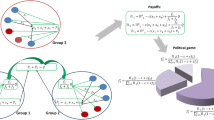Abstract
In open societies such as multi-agent systems, it is important that coordination among the several actors is achieved efficiently. One economical way of capturing that aspiration is consensus: social conventions and lexicons are good examples of coordinating systems, where uniformity promotes shared expectations of behavior and shared meanings. We are particularly interested in consensus that is achieved without any central control or ruling, through decentralized mechanisms that prove to be effective, efficient, and robust. The nature of interactions and also the nature of society configurations may promote or inhibit consensual emergence. Traditionally, preference to adopt the most seen choices (the majority option) has dominated the emergence convention research in multi-agents, being analyzed along different social topologies.
Recently, we have introduced a different type of interaction, based on force, where force is not defined a priori but evolves dynamically. We compare the Majority class of choice update against Force based interactions, along three dimensions: types of encounters, rules of interaction and network topologies. Our experiments show that interactions based on Force are significantly more efficient (fewer encounters) for group decision making.
Preview
Unable to display preview. Download preview PDF.
Similar content being viewed by others
References
Albert, R., Barabási, A.: Topology of evolving networks: local events and universality. Physical Review Letters 85, 5234–5237 (2000)
Antunes, L., Balsa, J., Urbano, P., Coelho, H.: Exploring context permeability in multiple social networks. In: Proceedings of the World Congress on Social Simulation (2008)
Antunes, L., Balsa, J., Urbano, P., Coelho, H.: The challenge of context permeability in social simulation. In: Proceedings of the Fourth European Social Simulation Association (2007)
Delgado, J.: Emergence of social conventions in complex networks. Artificial Intelligence 141(1/2), 171–185 (2002)
Delgado, J., Pujol, J.M., Sangüesa, R.: Emergence of coordination in scale-free networks. Web Intelligence and Agent Systems 1(2), 131–138 (2003)
Kaplan, F.: L’Emergence D’un Lexique Dans Une Population d’Agents Autonomes. PhD thesis, Université de Paris 6 (2000)
Kittock, J.E.: Emergent conventions and the structure of multi-agent systems. In: Nadel, L., Stein, D. (eds.) Studies in the Sciences of Complexity. 1993 Lectures in Complex Systems. Addison-Wesley, Reading (1995)
Kittock, J.E.: The impact of locality and authority on emergent conventions: Initial observations. In: Proceedings of the Twelfth National Conference on Artificial Intelligence, Seattle, WA, pp. 420–425 (1994)
Lakkaraju, K., Gasser, L.: A unified framework for multi-agent agreement. In: Durfee, E.H., Yokoo, M., Huhns, M.N., Shehory, O. (eds.) 6th International Joint Conference on Autonomous Agents and Multiagent Systems (AAMAS 2007), Honolulu, Hawaii, USA, May 14-18, p. 21, IFAAMAS (2007)
Lakkaraju, K., Gasser, L.: Norm Emergence in Complex Ambiguous Situations. In: Hubner, J.F., et al. (eds.) COIN 2008. LNCS (LNAI), vol. 5428. Springer, Heidelberg (2008)
Lewis, D.K.: Convention: A Philosophical Study. Harvard University Press, Cambridge (1969)
Pujol, J.M., Delgado, J., Sangüesa, R., Flache, A.: The role of clustering on the emergence of efficient social conventions. In: Kaelbling, L.P., Saffiotti, A. (eds.) IJCAI 2005, Proceedings of the Nineteenth International Joint Conference on Artificial Intelligence, Edinburgh, Scotland, UK, July 30-August 5, pp. 965–970. Professional Book Center (2005)
Salazar, N., Rodriguez-Aguilar, J.A., Arcos, J.L.: Infection-based self-configuration in agent societies. In: Ebner, M., Cattolico, M., van Hemert, J., Gustafson, S., Merkle, L.D., Moore, F.W., Congdon, C.B., Clack, C.D., Moore, F.W., Rand, W., Ficici, S.G., Riolo, R., Bacardit, J., Bernado-Mansilla, E., Butz, M.V., Smith, S.L., Cagnoni, S., Hauschild, M., Pelikan, M., Sastry, K. (eds.) GECCO 2008 Workshop: Evolutionary Computation and Multi-Agent Systems and Simulation (ECoMASS), Atlanta, GA, USA, July 12-16, pp. 1945–1952. ACM, New York (2008)
Shoham, Y., Tennenholtz, M.: Emergent conventions in multi-agent systems. In: Rich, C., Swartout, W., Nebel, B. (eds.) Proceedings of Knowledge Representation and Reasoning (KR&R 1992), pp. 225–231 (1992)
Shoham, Y., Tennenholtz, M.: Co-learning and the evolution of social acitivity. Technical Report CS-TR-94-1511, Stanford University, Department of Computer Science (1994)
Shoham, Y., Tennenholtz, M.: On the emergence of social conventions: Modeling, analysis and simulations. Artificial Intelligence 94(1-2), 139–166 (1997)
Steels, L.: The origins of ontologies and communication conventions in multi-agent systems. Autonomous Agents and Multi-Agent Systems 1(2), 169–194 (1998)
Tennenholtz, M.: Convention evolution in organizations and markets. Computational & Mathematical Organization Theory 2(4), 261–283 (1996)
Urbano, P.: Consensual paintings. In: Rothlauf, F., Branke, J., Cagnoni, S., Costa, E., Cotta, C., Drechsler, R., Lutton, E., Machado, P., Moore, J.H., Romero, J., Smith, G.D., Squillero, G., Takagi, H. (eds.) EvoWorkshops 2006. LNCS, vol. 3907, pp. 622–632. Springer, Heidelberg (2006)
Urbano, P., Balsa, J., Antunes, L., Moniz, L.: Efficiency of the emergence of consensus in complex networks - assessing force influence. In: Costa, A.R. (ed.) Proceedings of the BWSS/SBIA Workshop (2008)
Urbano, P., Coelho, H.: From consensus to consensus: Random evolution of collective choices. In: Bento, C., Cardoso, A., Dias, G. (eds.) EPIA 2005, pp. 274–279. IEEE, Los Alamitos (2005)
Walker, A., Wooldridge, M.: Understanding the emergence of conventions in multi-agent systems. In: Lesser, V.R., Gasser, L. (eds.) Proceedings of the First International Conference on Multiagent Systems (ICMAS), June 12-14, pp. 384–389. MIT Press, San Francisco (1995)
Watts, D.J., Strogatz, S.H.: Collective dynamics of ‘small-world’ networks. Nature 393, 440–442 (1998)
Watts, D.J.: Small Worlds: The Dynamics of Networks Between Order and Randomness. Princeton University Press, Princeton (1999)
Wilensky, U.: NetLogo, Center for Connected Learning and Computer-Based Modeling, Northwestern University. Evanston, IL (1999) http://ccl.northwestern.edu/netlogo/
Author information
Authors and Affiliations
Editor information
Editors and Affiliations
Rights and permissions
Copyright information
© 2009 Springer-Verlag Berlin Heidelberg
About this paper
Cite this paper
Urbano, P., Balsa, J., Antunes, L., Moniz, L. (2009). Force Versus Majority: A Comparison in Convention Emergence Efficiency. In: Hübner, J.F., Matson, E., Boissier, O., Dignum, V. (eds) Coordination, Organizations, Institutions and Norms in Agent Systems IV . COIN 2008. Lecture Notes in Computer Science(), vol 5428. Springer, Berlin, Heidelberg. https://doi.org/10.1007/978-3-642-00443-8_4
Download citation
DOI: https://doi.org/10.1007/978-3-642-00443-8_4
Publisher Name: Springer, Berlin, Heidelberg
Print ISBN: 978-3-642-00442-1
Online ISBN: 978-3-642-00443-8
eBook Packages: Computer ScienceComputer Science (R0)




